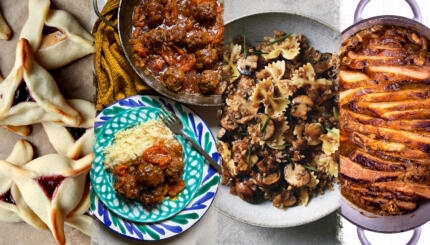Rosh Hashanah may look a little different this year, but it is still a time to celebrate the new year, spend time with family and friends, engage in self-reflection, and enjoy some delicious food. To help celebrate Rosh Hashanah, I reached out to several Keshet staff members to ask them about their favorite traditions, what the holiday means to them, and how they are planning on celebrating this year. Let us know in the comment section below about your plans for Rosh Hashanah!
Amram Altzman (he/him/his)
Youth Programs Manager
“For me, Rosh Hashanah is a time to reflect. In the past, my husband and I used to host a large dinner on the first night for a bunch of our friends, and we would go around and share one good thing that we’ve done or learned about ourselves in the past year. It’s a really beautiful moment for a bunch of us to come together, celebrate, and reflect — not just on the things we would like to do better in the coming year, but also as a way to celebrate the ways we’ve grown and changed over the past year of our lives.”
Rabbi Micah Buck-Yael (he/him/his)
Director of Education and Training
“So, I’m a bit of a liturgy nerd (yes, that’s a thing!) and I particularly love the prayers, the poetry, and the melodies for Rosh Hashanah. There is such drama to the prayers that we recite, and being there in the middle of that with my community is always so powerful. I’m going to miss that so much this year!
What I am going to dive into more this year is the food. There is a tradition of cooking foods for Rosh Hashanah dinner that embodies our intentions for the year that is beginning – through their shapes, their history, or amazingly bad puns on their names. Things like round challah to remind us that we have returned back to the beginning of the year, lubiya (a stew of black-eyed peas, whose name in Arabic sounds just a little bit like a word meaning “increase” in Hebrew), or dishes cooked with carrots (which lend themselves to a different pun whether you use English, Hebrew, or Yiddish!), sweet foods to symbolize a sweet year … the list goes on and on. I love putting the effort into cooking my family’s traditional foods and coming up with new ones – it feels like a way to connect with my intentions for the year, and also to make the internal preparations for a new year feel more concrete.”
Jaimie H. Krass (she/her/hers)
National Director of Youth Programs
“My favorite tradition around Rosh Hashanah is tashlich, a ritual during which we symbolically — using bread, pebbles, or, my favorite, seashells –“cast off” into a body of water whatever we feel could hold us back from being our full selves in the year ahead. For me, it’s a chance to really check in with myself, to forgive myself, to uplift myself, and to ready myself for a (hopefully sweet!) new year.”
Essie Shachar-Hill (they/them/theirs)
Chicago Education and Training Manager
“My family sends Rosh Hashanah cards every year. When I still lived at home, my whole family would sit down together before the New Year and spend several hours writing and signing cards to our friends and family around the world. While my dad and my brother and I sometimes groaned when it was card-signing time, it’s actually a lovely tradition that makes me reflect on how lucky I am to have loving family and friends who I want to stay in touch with. Even though I don’t live with my parents anymore, I still sneak in some card-signing when I visit in the summers.”
Emily Saltzman (she/her/hers)
Associate Director of Education and Training
“I have celebrated Rosh Hashanah differently for most years of my life. When I was a child in Minneapolis it was going to Temple with my dad and eating apples and honey. In my twenties, in Brooklyn, it was walking to a community shul for morning services and spending the rest of the day in Prospect Park noshing and chatting with friends passing by. And now in my thirties back in Minneapolis, singing songs in a round with community members both old and new. In this new state of things where we must be socially distant, I plan to create a havurah to share in joyful singing (if possible) and ritual to bring in the sweet new year.”
Dylan Goodman (he/him/his)
Donor Relations Manager
“Rosh Hashanah and the High Holidays remind me of autumn in Raleigh, North Carolina – getting dressed up to go to synagogue, eating apples and honey, hearing the shofar. But, to me, Yom Kippur was more meaningful. I sometimes think Yom Kippur is my favorite Jewish holiday because of its contemplative nature and because it made me feel most connected to my Jewishness.
I remember days in the North Carolina public school system and having to determine my Jewish “outness.” Actions such as if I were to fast in class, if I were to take the day off to go to services, and if I needed to explain my belief system to a teacher. It was hard having to wrestle with my being other in a predominantly Christian environment, and it so too strengthened my understanding of oppression and set the groundwork for being in solidarity with other marginalized communities.
Yom Kippur brought my small extended family together to connect and celebrate the end of hunger pangs with kugel and bagels and dried fish. I remember the sweetness after sundown. To this day, my Yom Kippur practice reminds me to take pride in my Judaism and to return to this appreciation for the simple joys: food, community, and authenticity to the self.”
Rosh Hashanah
Pronounced: roshe hah-SHAH-nah, also roshe ha-shah-NAH, Origin: Hebrew, the Jewish new year.
Yom Kippur
Pronounced: yohm KIPP-er, also yohm kee-PORE, Origin: Hebrew, The Day of Atonement, the holiest day on the Jewish calendar and, with Rosh Hashanah, one of the High Holidays.
Tashlich
Pronounced: TAHSH-likh (short i), Origin: Hebrew, literally “cast away,” tashlich is a ceremony observed on the afternoon of the first day of Rosh Hashanah, in which sins are symbolically cast away into a natural body of water. The term and custom are derived from a verse in the Book of Micah (7:19).
shofar
Pronounced: sho-FAR or SHO-far, Origin: Hebrew, a ram’s horn that is sounded during the month of Elul, on Rosh Hashanah, and on Yom Kippur. It is mentioned numerous times in the Bible, in reference to its ceremonial use in the Temple and to its function as a signal-horn of war.


